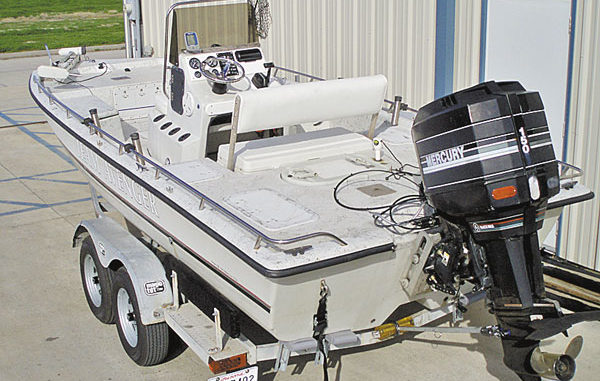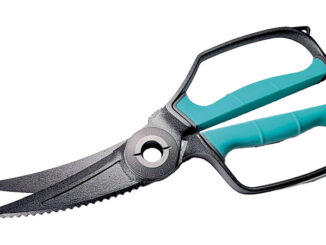
Wow, what a winter we had! We saw record rainfall totals, cold temperatures, high winds and tides so low that many waterways were reduced to mud flats.
The challenges that Mother Nature threw at us, the magical season that the New Orleans Saints had and the celebration that followed throughout the Mardi Gras season all conspired to keep an extremely large portion of our boating public dry docked.
I don’t know about you, but I’m ready to hit the great outdoors. My son and I have just finished refurbishing a 21-foot bay boat he recently purchased, and we are ready to start chasing speckled trout and redfish. A large part of the refurbishing that was performed on this rig was just simple annual maintenance. This is something that should be done to all boats once a year.
For most boaters, springtime is the beginning of their busiest boating season, so now is prime time to get your boat out of storage and get it ready to hit the waves.
I like to start with what I consider the most-important part of my rig — the trailer. Your boat will probably spend 90 percent of its life on the trailer, either in storage or in transit to and from the water. Trailers are often overlooked, and that can lead to major problems on the road.
Your trailer tires need to be checked often to be sure they are properly inflated. Check the sidewall of the tire to find the recommended PSI inflation for your tires. Under-inflated tires will overheat and could have a blow out. Always keep your tires inflated to the maximum pressure recommended. This will extend the life of the tires and will also lower your fuel consumption for your tow vehicle.
While you are inflating your tires, check them closely for signs of dry rot. As the tires get older, the rubber begins to get small cracks usually on the side walls first. When this occurs, it is time to invest in a new set of tires.
Now is a great time to check your trailer bearings. Just jack up each wheel until it clears the ground. Grip the wheel and try to rock it back and forth, and spin the tire while listening carefully for any growling or grinding noises. If you feel slack in the wheel, or you hear a growling noise when spinning the wheel, you will need to do a bearing job.
The next thing on my trailer list is the lights. You will need to hook up the trailer to your tow vehicle and test each of the light circuits to verify that they work. Stop signals, turn indicators and running lights are not only required by law, but they could help prevent having another motorist crashing into your boat.
Once the trailer is taken care of, you can move on up to the boat and motor. First check your battery; make sure it is fully charged. Remove and clean the wire terminals. Reinstall the wires, and tighten the wing nuts with a wrench. Loose wing nuts can cause premature failures in your ignition and charging systems.
The engine has been laid up for several months, and it will require a little tender, loving care. A compression test should be first on your list. Weak compression is a sign of a serious internal problem, which a simple tune-up will not cure. If compression is good, perform a spark test to verify that the ignition system is functioning. Be careful — those spark plugs pack a wallop. If you do not use the proper insulated tools, you could get a big shock. Once you have checked compression and spark, install a fresh set of spark plugs.
Check your fuel lines for any signs of leakage, and replace all fuel filters. If your boat has a water-separating fuel filter, get a glass jar, and drain the contents of the filter into the jar. This will allow you to see if there are any impurities in the fuel. If you see small black flakes in the fuel, this could be an indication that ethanol in your fuel has begun to eat away at the rubber fuel lines. Now would be a good time to replace the rubber lines with alcohol-resistant fuel lines.
If you find water in the fuel, you will need to thoroughly check the fuel tank, fill and vent lines, fill cap and fuel gauge sender to ensure they are not a source of water getting into the gas. If you eliminate any source of water seepage, you may be experiencing faze separation in your fuel. Ethanol in the gas pulls moisture from the air. When this moisture content gets high enough, the water and alcohol will separate from the gas and settle to the bottom of your tank. If this has occurred, you should have your tank drained by a qualified professional.
The lower unit oil should be checked for water or metal particle contamination. Simply tilt your engine approximately half way up. Remove the bottom oil drain plug from the lower unit. Water is heavier than oil so if there is any water present, it will have settled down to the lowest point, which is at the drain plug. If water comes out of the drain plug, then the lower unit will need to be resealed.
Most engines are equipped with a magnetic drain plug in the lower unit, so if there are any metal particles in the oil, they will be attracted to that magnet. Metal particles on the magnet can indicate a problem with the gears in the unit, and should be checked immediately. If there are no contaminants in the oil, then remove the vent plug, and allow the lower unit to drain. Once emptied, refill the unit with fresh oil.
Don’t forget to check all of the accessories in your boat. Turn on the navigation lights, bilge pump, courtesy lights and aerator pump to verify they all work. Check your life jackets to be sure they are in usable condition. If there are any tears in the material, or the straps are broken, then replace them immediately.
Check the expiration date on your signal flares. Signal flares expire every three years. If yours are out of date, dispose of them and get a set of fresh replacements.
There should be a gauge on your fire extinguisher. If it indicates the extinguisher is discharged, replace it.
The last item on the check list is to run and check the engine. I highly recommend taking the boat to the water and going on a simple shake-down cruise. You can run your engine all day long on the garden hose and never duplicate an actual water test.
Monitor your instruments. Is the engine turning the proper RPMs? What is the water pressure reading? Does your volt meter show that the alternator is recharging the battery? Is your fuel gauge working?
Make notes of any abnormalities, and consult your dealer about them.
Be safe and enjoy our state’s great resources. If you have any questions about your boat, motor or trailer, e-mail me at theboatdr@yahoo.com.


